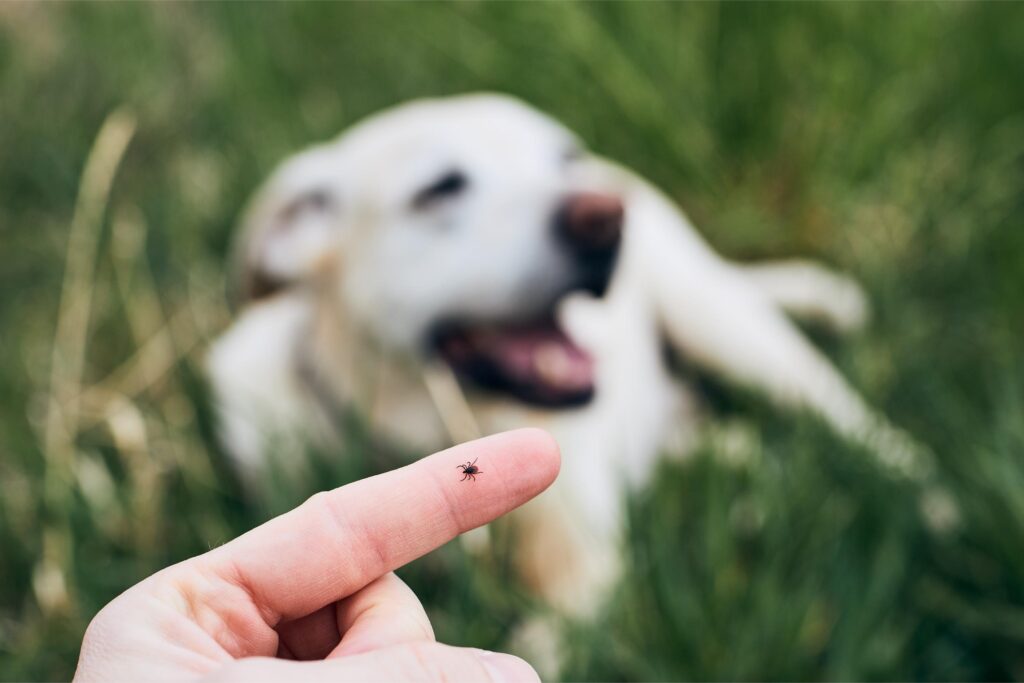
Tick Talk: Safeguarding Your Pet

The summer months are prime time for outdoor adventures with your beloved four-legged friend. However, as you plan exciting hikes and camping trips, it’s important to be mindful of the potential risks of ticks and the dangers they pose. At Arlington Animal Hospital, we want to ensure you and your furry companion can enjoy a fun-filled, worry-free summer!
Understanding the Threat of Ticks
Ticks are tiny parasites that can transmit diseases, including Lyme disease, to humans and pets. These pests thrive in wooded and grassy areas, making them a common concern during outdoor activities. While ticks are most active during the warmer months, they can still pose a risk throughout the year, making preventive measures essential.
Read about the importance of year-round parasite prevention in this related blog post.
Prevention is Key
Flea and tick prevention is crucial, especially for active pets who frequent dog parks, hiking trails, or other areas where these pests thrive. Consistently using veterinarian-recommended preventive treatments, such as oral medications and spot-on solutions, can protect your pet from infestations and tick-borne illnesses such as Lyme disease.
We’ll work closely with you to develop a customized parasite prevention plan tailored to your pet’s needs and lifestyle. Factors such as age, breed, medical history, and activity level all play a role in determining the most effective strategy. Trust us to help safeguard your furry friend from these unwanted guests, allowing you both to fully enjoy the warm weather adventures.
Avoiding Ticks: Proactive Steps for Pet Owners
Protecting your pet from ticks should be a top priority. Here are some effective strategies to help you avoid these pesky critters:
- Conduct a thorough body check on your pet after outdoor adventures. Carefully inspect their coat, ears, and paws for any signs of ticks.
- Stick to well-groomed trails when hiking or exploring wooded areas, and avoid tall grass or shrubbery where ticks may lurk.
- After outdoor activities, promptly remove your pet’s collar or harness and wash it with hot, soapy water to eliminate potential ticks.
What to Do If Your Pet Gets a Tick Bite
Ticks can sometimes find their way onto your pet despite your best efforts. If you notice a tick embedded in your pet’s skin, stay calm and take the following steps:
- Use fine-tipped tweezers to grasp the tick as close to the skin as possible and pull it out with a steady, gentle motion.
- Avoid twisting or crushing the tick, as this can increase the risk of transmitting diseases.
- After removal, clean the bite area with antiseptic and monitor your pet for any signs of illness, such as lethargy, fever, or loss of appetite.
If you have concerns or notice any unusual symptoms, don’t hesitate to contact Arlington Animal Hospital for professional guidance and treatment.
Prioritizing Your Pet’s Well-Being
At Arlington Animal Hospital, we understand the importance of keeping your furry friend safe and healthy. Our team of experienced veterinarians is dedicated to providing comprehensive care and advice to ensure your pet’s well-being. If you have any questions or concerns about tick prevention, Lyme disease, or any other pet-related matter, we encourage you to schedule an appointment online or call our office today.
Together, we can create lasting memories of outdoor adventures with your beloved companion, free from the worries of ticks and the diseases they carry.
Contact Us!
2301 Columbia Pike #G-1, Arlington, VA 22204
Phone: (703) 920-5300
Fax: (703) 685-8860
Email: info@myarlingtonvet.com
Office Hours
-
Monday
8 a.m. – 8 p.m.
-
Tuesday
8 a.m. – 8 p.m.
-
Wednesday
8 a.m. – 6 p.m.
-
Thursday
8 a.m. – 6 p.m.
-
Friday
8 a.m. – 6 p.m.
-
Saturday
8 a.m. – 2 p.m.
-
Sunday
CLOSED
- Doctors’ hours are by appointment only.



